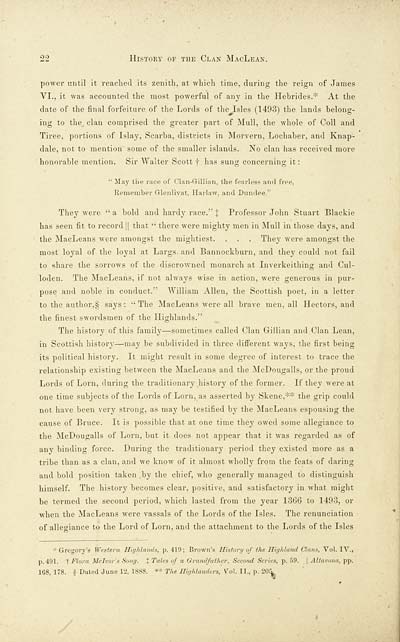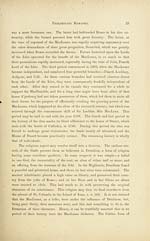History of the Clan MacLean from its first settlement at Duard Castle, in the Isle of Mull, to the present period
(28) Page 22
Download files
Complete book:
Individual page:
Thumbnail gallery: Grid view | List view

22 History of the Clan MacLean.
power until it reached its zenith, at which time, during the reign of James
VI., it was accounted the most powerful of any in the Hebrides.* At the
date of the final forfeiture of the Lords of the Isles (1493) the lands belong-
ing to the clan comprised the greater part of Mull, the whole of Coll and
Tiree, portions of Islay, Scarba, districts in Morvern, Lochaber, and Knap-
dale, not to mention some of the smaller islands. No clan has received more
honorable mention. Sir Walter Scott f has sung concerning it :
" May Ihe. race of Clan-Gillian, the fearless and free,
Remember Glenlivat, Harlaw, and Dundee."
They were "a bold and hardy race." J Professor John Stuart Blackie
has seen fit to record || that " there were mighty men in Mull in those days, and
the MacLeans were amongst the mightiest. . . . They were amongst the
most loyal of the loyal at Largs and Bannockburn, and they could not fail
to share the sorrows of the discrowned monarch at Inverkeithing and Cul-
loden. The MacLeans, if not always wise in action, were generous in pur-
pose and noble in conduct." William Allen, the Scottish poet, in a letter
to the author, § says : " The MacLeans were all brave men, all Hectors, and
the finest swordsmen of the Highlands."
The history of this family — sometimes called Clan Gillian and Clan Lean,
in Scottish history^may be subdivided in three different waj's, the first being
its political history. It might result in some degree of interest to trace the
relationship existing between the MacLeans and the McDougalls, or the proud
Lords of Lorn, during the traditionary history of the former. If they were at
one time subjects of the Lords of Lorn, as asserted by Skene,** the grip could
not have been very strong, as may be testified by the MacLeans espousing the
cause of Bruce. It is possible that at one time they owed some allegiance to
the McDougalls of Lorn, but it does not appear that it was regarded as of
any binding force. During the traditionary period they existed more as a
tribe than as a clan, and we know of it almost wholly from the feats of daring
and bold position taken by the chief, who generally managed to distinguish
himself. The history becomes clear, positive, and satisfactory in what might
be termed the second period, which lasted from the year 1366 to 1493, or
when the MacLeans were vassals of the Lords of the Isles. The renunciation
of allegiance to the Lord of Lorn, and the attachment to the Lords of the Isles
■-•■ Gret;ory's Western Highlands, p. 410; Brown's Hhiory of the Highland Ctans, Vol. IV.,
p. 491. 1 Flora Mclvoi-'s Sung, t Tales oj a Grandfather, Second Series, p. 59. [\ Altavona, pp.
168, 178. ? Dated June li, 1888. »» The Highlanders, Vol. II., p. 20r^_
power until it reached its zenith, at which time, during the reign of James
VI., it was accounted the most powerful of any in the Hebrides.* At the
date of the final forfeiture of the Lords of the Isles (1493) the lands belong-
ing to the clan comprised the greater part of Mull, the whole of Coll and
Tiree, portions of Islay, Scarba, districts in Morvern, Lochaber, and Knap-
dale, not to mention some of the smaller islands. No clan has received more
honorable mention. Sir Walter Scott f has sung concerning it :
" May Ihe. race of Clan-Gillian, the fearless and free,
Remember Glenlivat, Harlaw, and Dundee."
They were "a bold and hardy race." J Professor John Stuart Blackie
has seen fit to record || that " there were mighty men in Mull in those days, and
the MacLeans were amongst the mightiest. . . . They were amongst the
most loyal of the loyal at Largs and Bannockburn, and they could not fail
to share the sorrows of the discrowned monarch at Inverkeithing and Cul-
loden. The MacLeans, if not always wise in action, were generous in pur-
pose and noble in conduct." William Allen, the Scottish poet, in a letter
to the author, § says : " The MacLeans were all brave men, all Hectors, and
the finest swordsmen of the Highlands."
The history of this family — sometimes called Clan Gillian and Clan Lean,
in Scottish history^may be subdivided in three different waj's, the first being
its political history. It might result in some degree of interest to trace the
relationship existing between the MacLeans and the McDougalls, or the proud
Lords of Lorn, during the traditionary history of the former. If they were at
one time subjects of the Lords of Lorn, as asserted by Skene,** the grip could
not have been very strong, as may be testified by the MacLeans espousing the
cause of Bruce. It is possible that at one time they owed some allegiance to
the McDougalls of Lorn, but it does not appear that it was regarded as of
any binding force. During the traditionary period they existed more as a
tribe than as a clan, and we know of it almost wholly from the feats of daring
and bold position taken by the chief, who generally managed to distinguish
himself. The history becomes clear, positive, and satisfactory in what might
be termed the second period, which lasted from the year 1366 to 1493, or
when the MacLeans were vassals of the Lords of the Isles. The renunciation
of allegiance to the Lord of Lorn, and the attachment to the Lords of the Isles
■-•■ Gret;ory's Western Highlands, p. 410; Brown's Hhiory of the Highland Ctans, Vol. IV.,
p. 491. 1 Flora Mclvoi-'s Sung, t Tales oj a Grandfather, Second Series, p. 59. [\ Altavona, pp.
168, 178. ? Dated June li, 1888. »» The Highlanders, Vol. II., p. 20r^_
Set display mode to:
![]() Universal Viewer |
Universal Viewer | ![]() Mirador |
Large image | Transcription
Mirador |
Large image | Transcription
Images and transcriptions on this page, including medium image downloads, may be used under the Creative Commons Attribution 4.0 International Licence unless otherwise stated. ![]()
| Histories of Scottish families > History of the Clan MacLean from its first settlement at Duard Castle, in the Isle of Mull, to the present period > (28) Page 22 |
|---|
| Permanent URL | https://digital.nls.uk/94802219 |
|---|
| Description | A selection of almost 400 printed items relating to the history of Scottish families, mostly dating from the 19th and early 20th centuries. Includes memoirs, genealogies and clan histories, with a few produced by emigrant families. The earliest family history goes back to AD 916. |
|---|
![[Page 21]Preliminary remarks](https://deriv.nls.uk/dcn4/9480/94802209.4.jpg)
